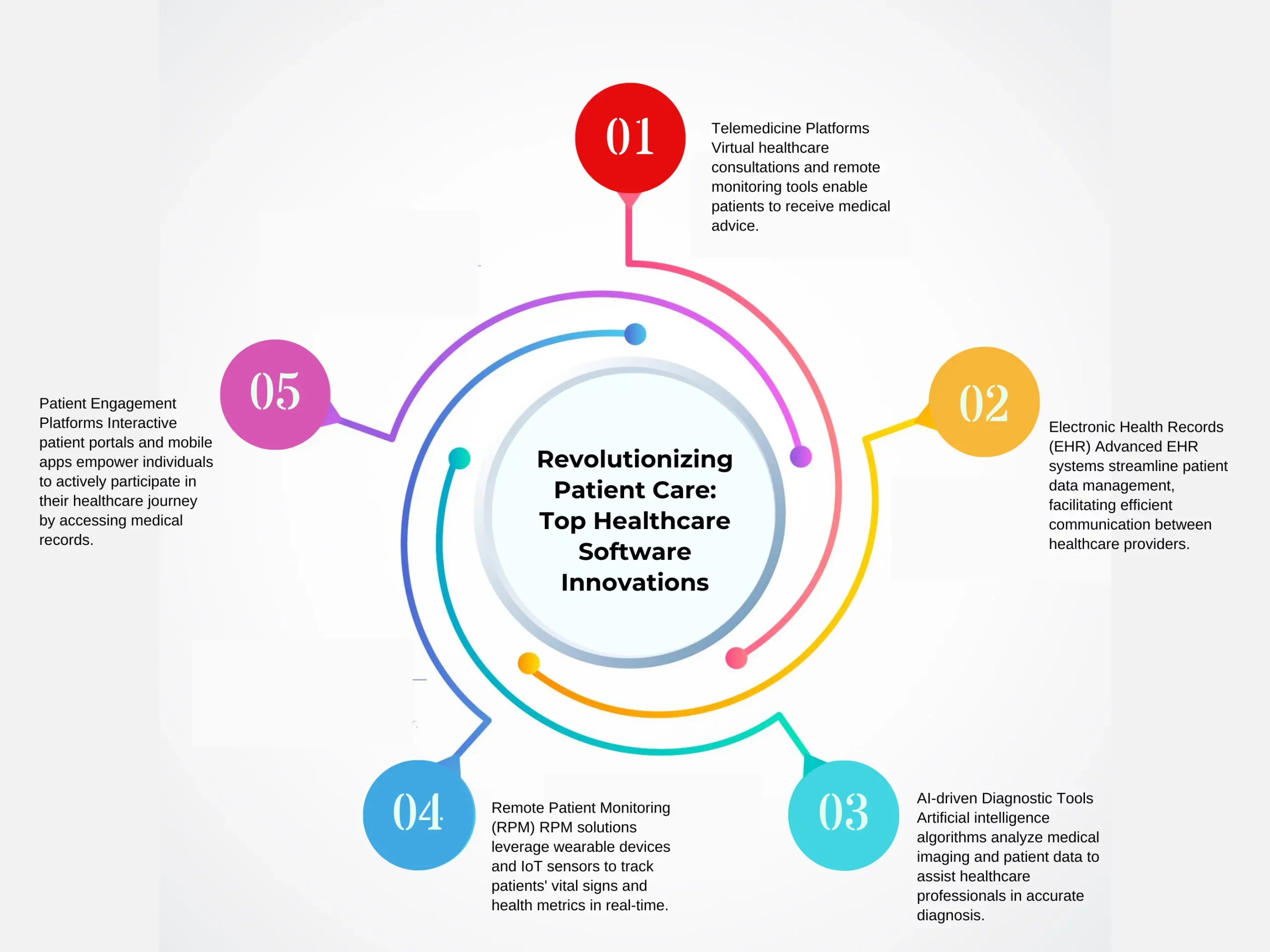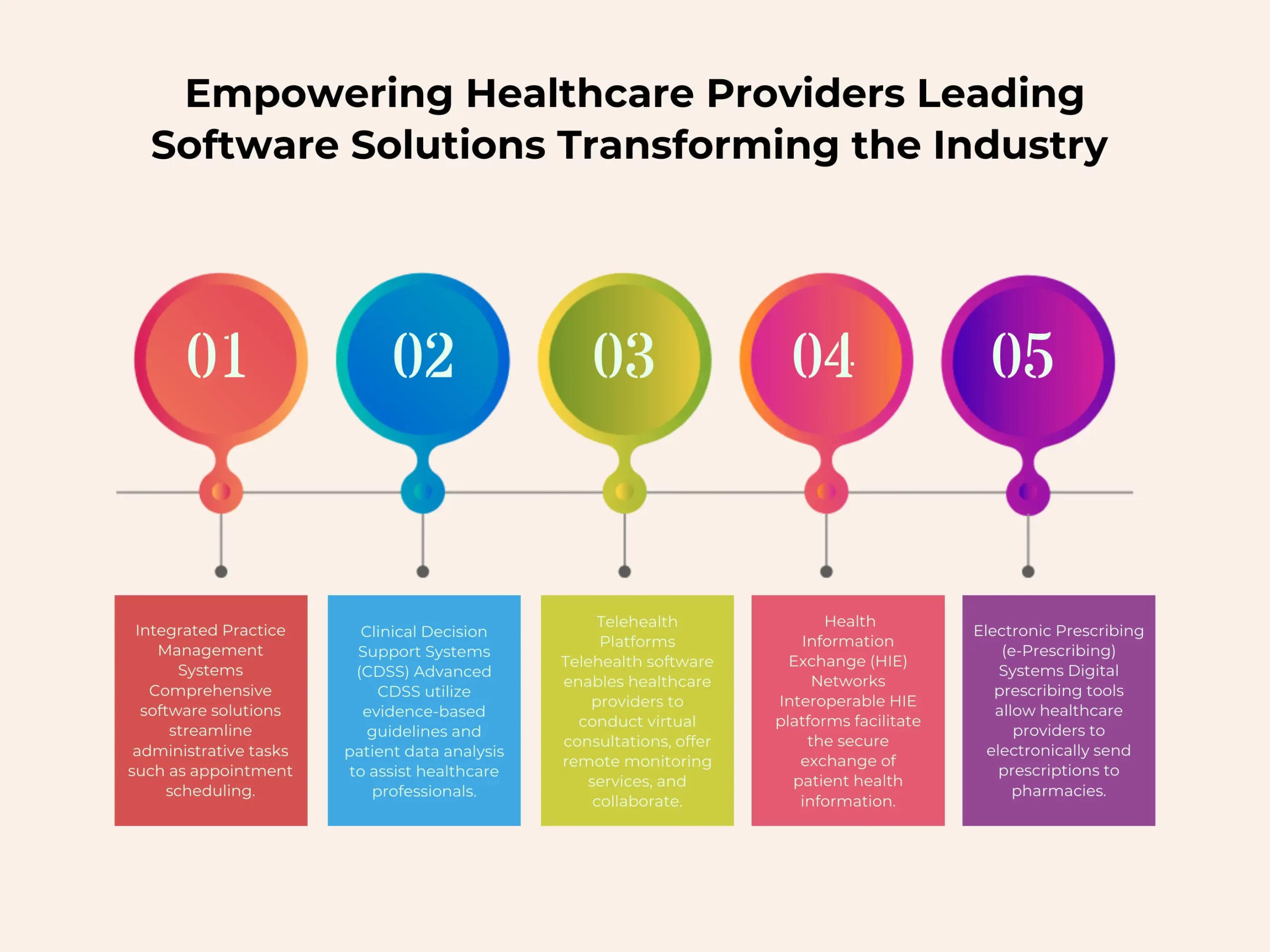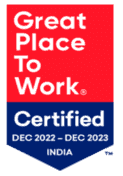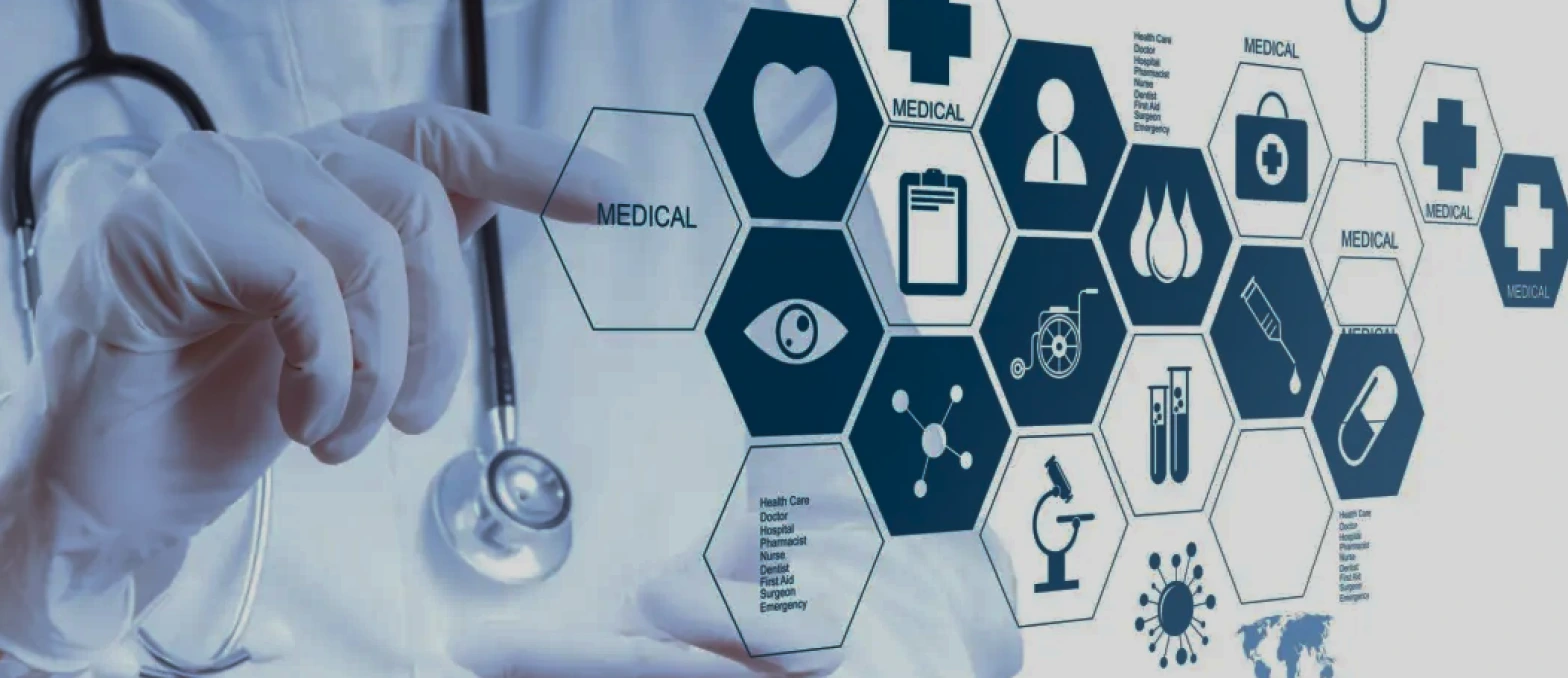In 2024, the scene of healthcare software companies in USA will be set apart by development, proficiency, and a promise to propel patient consideration. These companies assume a significant part in reforming the healthcare business through the development and execution of state of the art software solutions. Industry reports project the global healthcare IT market will reach over $390 billion by 2025. This reflects the growing demand for better technology in healthcare.
As the healthcare area keeps on developing, the job of software companies turns out to be progressively basic in tending to the business’ mind boggling difficulties and driving extraordinary change. Healthcare software companies offer various solutions. They incorporate electronic health records (EHR) systems, telemedicine platforms, and artificial intelligence (AI) instruments. The solutions aim to further develop productivity and results and enable patients.
As well as driving advancement, healthcare software companies contribute essentially to the economy. According to data from the Bureau of Labor Statistics, the software publishing industry in the USA employs over 450,000 individuals, with a median annual wage well above the national average.
The top healthcare software companies in USA for 2024 are at the forefront of technology. They utilize the most recent AI, machine learning, and data investigation to meet the changing necessities of healthcare software development services. These companies focus on variables like interoperability, security, and client experience to convey solutions that seamlessly coordinate into existing work processes and drive quantifiable outcomes.
As we dig into the 17 best healthcare software companies in USA for 2024, we will investigate their key contributions, market effect, and obligation to development. These companies, with their ability and commitment, are forming the eventual fate of healthcare conveyance and upsetting the manner in which we approach patient consideration.
Transform Your Healthcare Software Vision into Reality – Book A 30 Minutes Free Consultation!
Introduction to Healthcare Software Companies
Healthcare software companies assume an urgent part in forming the scene of present day healthcare conveyance, driving development, productivity, and patient-focused care. These companies have some expertise in making an extensive variety of software solutions. They tailor the solutions to meet the different requirements of healthcare software development companies in USA, clinicians, and patients. Industry forecasts project the global healthcare IT market to surpass $390 billion by 2025. The demand for advanced software in healthcare keeps rising.
These companies leverage cutting-edge technologies, for example, artificial intelligence determination, medical and data investigation to upset healthcare conveyance, work on quiet results, and streamline managerial processes. Healthcare software companies offer a full arrangement of items. They incorporate electronic health records (EHR) systems, practice management software, telemedicine platforms, and medical imaging solutions. These items aim to upgrade clinical work processes, work with distant patient checking, and cultivate customized care.
Moreover, the Coronavirus pandemic has additionally sped up the reception of telehealth and remote observing solutions, driving expanded speculation and advancement in the healthcare software area. According to the Bureau of Labor Statistics, the healthcare software industry in the USA employs over 450,000 people. This highlights the big economic role of healthcare software companies. The companies are focused on gathering the changing requirements of healthcare organizations and patients. While creating items, they focus on elements like interoperability, data security, and client experience. We will dig further into healthcare software companies. We will investigate their critical contributions and market influence. They assume a groundbreaking part in propelling healthcare conveyance and further developing patient consideration results.

Exploring Innovative Solutions from Top Healthcare Software Companies
Software companies are at the cutting edge of advancement, ceaselessly creating noteworthy solutions to address the business’ most squeezing difficulties. These top healthcare software companies utilize cutting-edge technologies. In this aide, we will investigate the imaginative solutions presented by the top healthcare software companies, featuring their effect on custom software development companies in USA and patient results.
1. AI-Powered Diagnostic Tools
Firstly, Driving healthcare software companies are saddling the force of AI to foster analytic tools that examine medical pictures, pathology tests, and patient data with remarkable precision. These AI-driven solutions empower early location of infections, work on analytic exactness, and improve treatment arranging.
2. Telemedicine Platforms
With the ascent of telehealth services, healthcare software companies are creating far reaching telemedicine platforms that work with far off discussions, virtual visits, and telemonitoring of patients. These platforms empower healthcare suppliers to convey excellent consideration to patients in remote or underserved regions, further developing admittance to healthcare services.
3. Interoperable Electronic Health Records (EHR) Systems
Interoperability is a critical concentration for top healthcare software companies, which are creating EHR systems that seamlessly trade patient data across various healthcare settings and systems. Interoperable EHR systems further develop care coordination, decrease medical mistakes, and improve patient wellbeing.
4. Patient Engagement Solutions
Healthcare software companies are making patient commitment solutions that enable patients to play a functioning job in their healthcare process. These solutions incorporate patient entries, portable health applications, and remote observing gadgets that empower patients to get to their health information, speak with healthcare suppliers, and deal with their health conditions all the more actually.
5. Data Analytics and Predictive Modeling
Utilizing huge data examination and prescient displaying strategies, healthcare software companies are helping healthcare digital transformation companies settle on data-driven choices and work on tolerant results. These solutions investigate huge volumes of healthcare data to recognize patterns, anticipate sickness episodes, enhance therapy conventions, and assign assets all the more effectively.
6. Blockchain Technology for Health Information Exchange
Some healthcare software companies are investigating the utilization of blockchain innovation to get health information trade and further develop data trustworthiness. Blockchain-based solutions offer improved security, straightforwardness, and interoperability, working with the safe sharing of delicate patient data among approved partners.
7. Population Health Management Platforms
Healthcare software companies are creating populace health management platforms that total and break down populace level health data to recognize in danger populaces, carry out designated mediations, and further develop general health results. These platforms empower healthcare organizations to proactively oversee ongoing illnesses, decrease healthcare costs, and further develop populace health measurements.
8. Remote Patient Monitoring Solutions
With the developing emphasis on esteem based care and populace health management, healthcare software companies are creating far off persistent observing solutions that empower nonstop checking of patients’ important bodily functions, side effects, and health ways of behaving beyond customary healthcare settings. These solutions support early mediation, lessen hospital readmissions, and work on quiet fulfillment.
9. Virtual Reality (VR) and Augmented Reality (AR) Applications
Healthcare software companies are investigating the utilization of virtual reality (VR) and Augmented reality (AR) technologies to upgrade medical training, patient education, and careful preparation. VR and AR applications give vivid learning encounters to healthcare experts and patients, further developing knowledge maintenance and careful results.
10. Precision Medicine Platforms
Progressions in genomics and customized medication have prodded the development of accuracy medication platforms by healthcare software companies. These platforms incorporate genomic, clinical, and populace health data. It is utilized to tailor medicines to patients’ hereditary cosmetics, lifestyle, and climate. This prompts more powerful and customized healthcare.
Understanding the Role of Healthcare Software Companies in 2024
In 2024, healthcare software companies will be crucial players in reshaping the healthcare scene, driving advancement, and upgrading patient consideration results. These companies are at the very front of creating cutting-edge solutions. The solutions are tailored to meet the changing requirements of healthcare learning management systems, clinicians, and patients. Their job reaches out past simple mechanical development to include working with care coordination, enabling patients, and upgrading clinical work processes. This guide digs into the diverse job of healthcare software companies in 2024, investigating their commitments to healthcare development and their effect on partners.
1. Driving Technological Advancements
Firstly, Healthcare software companies are instrumental in driving mechanical progressions across different domains, like artificial intelligence (AI), machine learning, data examination, and interoperability. These progressions empower healthcare organizations to leverage data-driven bits of knowledge, automate undertakings, and upgrade dynamic processes, accordingly working on generally productivity and adequacy.
2. Facilitating Care Coordination
Through interoperable electronic health record (EHR) systems, telehealth platforms, and specialized tools, healthcare software companies work with seamless information trade and cooperation among healthcare suppliers. This empowers more productive consideration coordination across multidisciplinary groups and different healthcare settings, at last prompting work on understanding results.
3. Empowering Patients
Healthcare software companies are progressively centered around engaging patients to effectively partake in their healthcare process. Patient commitment solutions, including versatile health applications, patient gateways, and wearable gadgets, permit patients to get to their health information, speak with healthcare suppliers, and deal with their health conditions all the more successfully, advancing better self-management and commitment.
4. Enhancing Clinical Decision Support
Healthcare software companies’ clinical choice help tools help healthcare suppliers in going with educated choices at the point regarding care. By dissecting patient data, proof based rules, and best practices, these tools give customized therapy suggestions, upgrade indicative precision, and alleviate medical blunders, accordingly working on quiet security and nature of care.
5. Supporting Population Health Management
With an emphasis on populace health management and worth based care, healthcare software companies foster platforms that total and break down populace level health data. These platforms help software development outsourcing services find in at-risk populations. They can then do designated intercessions and further develop health results. This occurs at both individual and local area levels. It assists with tending to healthcare variations and further develop generally speaking populace health.
6. Improving Administrative Efficiency
Healthcare software companies streamline managerial processes. They do this by advancing income cycle management through solutions. These incorporate practice management software, charging and coding systems, and electronic claims processing platforms. Custom software development services automate manual errands and diminish authoritative weights. These solutions upgrade functional productivity and monetary execution for healthcare organizations.
7. Enabling Telehealth and Remote Monitoring
Because of the Coronavirus pandemic and the rising interest for virtual consideration choices, healthcare software companies are extending telehealth and remote observing solutions. These platforms work with far off meetings, virtual visits, and remote observing of patients’ important bodily functions and side effects, upgrading admittance to mind, advancing patient security, and guaranteeing coherence of services.
8. Ensuring Data Security and Privacy
Healthcare software companies focus on data security and protection to shield delicate patient information from unapproved access, breaks, and digital dangers.
9. Promoting Interoperability
Interoperability remains a critical concentration for healthcare software companies as they work to guarantee seamless data trade and interoperability across different healthcare systems and applications. By sticking to interoperability principles and creating interoperable solutions, these companies work with information sharing, care coordination, and care changes, eventually further developing consideration quality and patient results.
10. Driving Value-Based Care Initiatives
Healthcare software companies support esteem based care drives by giving tools and technologies that empower custom software development services USA to convey top caliber, cost-viable consideration. Through populace health examination, care coordination platforms, and patient commitment solutions, these companies assist healthcare organizations with accomplishing improved results, decrease costs, and upgrade patient fulfillment, in this manner driving the change towards esteem based care conveyance models.
Unlock Your Business Potential with Custom Healthcare Software Solutions. Contact us Today!
Top 17 Best Healthcare Software Companies in USA [2024]
The US has numerous healthcare software companies. They are well known for their inventive solutions and obligation to greatness. They offer a different cluster of items and services. The items incorporate electronic health records (EHR) systems, telehealth platforms, and data examination tools. We tailor the items to meet the changing requirements of healthcare suppliers and software development outsourcing services. In this aide, we present the best 17 healthcare software companies in the US for 2024. We feature their extraordinary assets, market presence, and commitments to propelling healthcare and patient results.
1. A3Logics
A3Logics is a CMMI Level 3 certified organization that has some expertise in educational software development services. Their imaginative way to deal with making easy to use educational applications for both versatile and web platforms separates them in the business. A3Logics’ ability lies in crafting engaging software solutions that upgrade the learning experience for clients, everything being equal, making education available and charming.
2. Epic Systems Corporation
Healthcare organizations overall broadly utilize Epic Systems Partnership’s electronic health record (EHR) systems. Their incorporated EHR platform offers robust elements for clinical documentation, patient management, and interoperability, enabling healthcare suppliers to convey great consideration proficiently and actually.
3. Cerner Corporation
Cerner Enterprise has some expertise in electronic health records (EHR), populace health management, and income cycle management solutions. Their inventive software solutions empower healthcare organizations to upgrade work processes, work on persistent results, and improve functional proficiency through streamlined processes and progressed examination.
4. Allscripts Healthcare Solutions, Inc.
Allscripts Healthcare Solutions, Inc. offers exhaustive electronic health record (EHR) and practice management software solutions tailored to hospital inventory management software, all things considered. Their set-up of solutions envelops clinical documentation, income cycle management, and patient commitment, enabling suppliers to convey facilitated, excellent consideration across the consideration continuum.
5. Meditech
Meditech is a main provider of coordinated electronic health record (EHR) software solutions intended for hospitals and healthcare organizations. Their natural EHR platform upholds clinical documentation, drug management, and choice help, working with seamless correspondence and coordinated effort among healthcare providers to convey protected and effective patient consideration.
6. NextGen Healthcare
NextGen Healthcare spends significant time in electronic health record (EHR) and practice management software solutions for mobile and specialty care rehearses. Their creative solutions streamline clinical work processes, work on quiet commitment, and enhance income cycle management, enabling providers to convey excellent consideration while boosting functional productivity.
7. Athenahealth, Inc.
Athenahealth, Inc. offers cloud-based electronic health record (EHR) and practice management software solutions intended to work on healthcare activities and upgrade patient consideration. Medical billing and coding software solutions give robust elements to planning, billing, and clinical documentation, empowering healthcare organizations to further develop effectiveness and efficiency while conveying great consideration.
8. McKesson Corporation
McKesson Enterprise is a worldwide innovator in healthcare innovation and dispersion services, offering an exhaustive arrangement of software solutions for healthcare organizations. Their set-up of solutions incorporates electronic health record (EHR), drug store management, and medical imaging solutions, enabling providers to convey protected, great consideration to patients while enhancing functional productivity.
9. GE Healthcare
GE Healthcare offers an extensive variety of medical imaging, checking, and information technologies for healthcare organizations around the world. Their inventive software solutions empower providers to analyze and treat patients all the more successfully, work on clinical results, and upgrade functional effectiveness through cutting edge investigation and data-driven experiences.
10. Siemens Healthineers
Siemens Healthineers gives symptomatic imaging and lab indicative solutions that leverage progressed investigation and artificial intelligence to empower accuracy medication and work on persistent results. Their creative software solutions help healthcare providers in giving customized care, working on analytic exactness, and streamlining healthcare conveyance.
11. eClinicalWorks
eClinicalWorks represents considerable authority in electronic health record (EHR) and practice management software solutions for wandering consideration rehearses. Their coordinated platform offers extensive elements for clinical documentation, income cycle management, and populace health management. Healthcare providers can convey excellent consideration while amplifying proficiency and efficiency with eClinicalWorks’ solutions intended to streamline work processes, upgrade patient commitment, and backing esteem based care drives.
12. Philips Healthcare
Philips Healthcare offers imaginative healthcare innovation solutions, including medical imaging, patient observing, and telehealth. Their software solutions leverage progressed investigation and artificial intelligence to work on indicative exactness, upgrade patient results, and improve healthcare conveyance. Philips Healthcare’s obligation to development and patient-driven care makes them a believed accomplice for hospital contract management software looking to drive extraordinary change in their practices.
13. Change Healthcare
Change Healthcare is a main provider of income cycle management and healthcare information innovation solutions. Their imaginative software solutions streamline billing and claims processing, further develop income trustworthiness, and upgrade interoperability. Change Healthcare’s far reaching set-up of solutions engages healthcare organizations to enhance monetary execution, decrease authoritative weight, and work on the general effectiveness of their activities.
14. IBM Watson Health
IBM Watson Health offers a set-up of healthcare innovation solutions fueled by artificial intelligence and data investigation. Their software solutions empower healthcare organizations to examine clinical and functional data, distinguish bits of knowledge, and drive informed direction. IBM Watson Health’s high level examination capacities and mental figuring technologies assist healthcare providers with working on persistent results, decrease costs, and improve the general nature of care.
15. Carestream Health
Carestream Health gives an extensive variety of medical imaging and healthcare IT solutions intended to work on indicative exactness and streamline work process. Their software solutions empower healthcare providers to catch, make due, and share medical pictures effectively, upgrading cooperation and correspondence among care groups. Carestream Health’s obligation to development and quality makes them a believed accomplice for healthcare organizations looking to streamline imaging tasks and convey unrivaled patient consideration.
16. Agfa HealthCare
Agfa HealthCare is a main provider of indicative imaging and healthcare IT solutions for healthcare organizations around the world. Their software solutions for radiology, cardiology, and venture imaging work with seamless picture management and understanding, working on indicative exactness and clinical navigation. Agfa HealthCare’s obligation to interoperability and advancement guarantees that healthcare providers approach the tools and assets they need to convey excellent consideration to patients.
17. Optum, Inc.
Optum, Inc. offers an extensive variety of healthcare innovation solutions, including populace health management, examination, and drug store care services. Their software solutions empower healthcare organizations to further develop care coordination, oversee risk, and advance clinical and monetary results for patients. Optum, Inc’s. complete set-up of solutions engages healthcare providers to prevail in the present worth based care climate by conveying significant experiences and empowering informed navigation.
Transform Your Business with Custom Healthcare Software. Request a Free Consultation Today!
Evaluate Key Features and Offerings of Healthcare Software Companies
Healthcare software companies assume an essential part in giving creative solutions to address the mind boggling difficulties looked by healthcare organizations. Numerous contributions are available. Healthcare organizations should cautiously assess the critical elements of these choices. They need to track down the best one for their necessities. This guide investigates the critical variables to consider while assessing the elements and contributions of healthcare software companies. It gives bits of knowledge into the dynamic process and methodologies for choosing a confided in accomplice in healthcare innovation.
1. Electronic Health Records (EHR) Systems
Firstly, Electronic Health Records (EHR) systems are fundamental parts of healthcare software solutions, empowering organizations to safely digitize and oversee patient health information. While assessing healthcare software companies, organizations ought to evaluate their EHR systems’ usefulness and abilities. This incorporates highlights like patient records, interoperability, layouts, and choice help tools. Furthermore, organizations ought to consider the organization’s history in EHR execution, client fulfillment, and adherence to administrative necessities like HIPAA.
2. Practice Management Software
Practice management software streamlines regulatory work processes and upgrades functional proficiency inside healthcare organizations. Organizations ought to assess the training management contributions of healthcare software companies, including elements, for example, arrangement booking, billing and coding, claims processing, and income cycle management. Also, organizations ought to survey the software’s mix abilities with different systems, like EHRs and bookkeeping software, as well as its versatility to oblige developing practices and advancing administrative necessities.
3. Telehealth and Remote Patient Monitoring
Telehealth and remote patient monitoring solutions have gained unmistakable quality, especially considering the Coronavirus pandemic, empowering distant meetings and observing of patients’ health status. While assessing healthcare software companies, organizations ought to survey their telehealth and far off understanding checking contributions. These incorporate elements like secure video calls, virtual visits, remote checking gadgets, and patient commitment tools. Furthermore, organizations ought to think about the software’s usability for the two providers and patients, as well as its similarity with existing systems and repayment models.
4. Population Health Management
Population health management solutions assist hospital with inventory management software further develop the health results of whole quiet populations by dissecting and overseeing health data at scale. Organizations ought to assess the population health management contributions of healthcare software companies. They ought to see highlights like risk definition, care coordination, prescient investigation, and population health dashboards. Moreover, organizations ought to evaluate the software’s interoperability with EHRs and different data sources, as well as its capacity to help esteem based care drives and population health intercessions.
5. Data Analytics and Business Intelligence
Data examination and business intelligence tools empower healthcare organizations to get noteworthy experiences from their data to help inform direction and drive execution improvement drives. While assessing healthcare software companies, organizations ought to survey their data examination and business intelligence contributions. These incorporate highlights like data perception, prescient displaying, benchmarking, and execution dashboards. Furthermore, healthcare learning management systems ought to consider the software’s mix abilities with EHRs and different data sources, as well as its adaptability and usability for non-specialized clients.
6. Interoperability and Integration Capabilities
Interoperability and joining abilities are vital contemplations while assessing healthcare software companies, as seamless data trade and interoperable work processes are fundamental for advancing consideration coordination and working on understanding results. Organizations ought to evaluate the organization’s interoperability principles, joining capacities, and similarity with industry guidelines like HL7, FHIR, and DICOM. Moreover, organizations ought to consider the software’s history in interoperability drives and its capacity to coordinate with different systems like EHRs, research center information systems (LIS), and imaging systems.
7. Data Security and Compliance
Data security and compliance are fundamental worries for software development outsourcing services, making them fundamental variables to consider while assessing healthcare software companies. Organizations ought to evaluate the organization’s data security. This incorporates encryption, access controls, and compliance with regulations like HIPAA, GDPR, and HITECH. Moreover, organizations ought to survey review reports, confirmations, and security appraisals. They need to guarantee that the software organization satisfies severe guidelines for safeguarding delicate health information and for keeping data hidden and classified.
8. Customer Support and Service
Compelling customer backing and administration are basic parts of a healthcare software organization’s contributions, guaranteeing that organizations get opportune help and goal of issues as they emerge. Organizations ought to assess the organization’s customer support contributions, including the availability, responsiveness, and ability of care staff. Additionally, organizations ought to evaluate the organization’s administration level arrangements (SLAs), heightening systems, and post-execution support choices. They need to guarantee that they get the important help all through the software’s life.
Via cautiously assessing these critical elements and contributions of healthcare software companies, organizations can choose a believed accomplice that lines up with their essential targets, functional requirements, and long haul objectives. An exhaustive evaluation of these elements empowers organizations to pursue informed choices and execute software solutions that drive development, work on quiet consideration, and upgrade the general quality and proficiency of healthcare conveyance.
Compare Performance and Reputation of Healthcare Software Companies
Selecting the right software organization is significant for healthcare organizations aiming to enhance patient consideration, streamline activities, and drive development. With a plenty of healthcare software companies competing for focus, assessing their presentation and notoriety is fundamental for settling on informed choices. This guide investigates the vital elements to consider while looking at the presentation and notoriety of healthcare software companies. It gives experiences into the dynamic process and techniques for picking a confided in accomplice in healthcare innovation.
1. Industry Experience and Track Record
Firstly, The business experience and history of healthcare software companies frequently mirror their exhibition and notoriety. Organizations ought to evaluate the organization’s residency in the healthcare area, remembering the quantity of years for activity, effective executions, and client tributes. An organization with a demonstrated history exhibits dependability, steadiness, and a profound comprehension of healthcare difficulties and prerequisites.
2. Client Satisfaction and Testimonials
Client satisfaction and testimonials offer significant experiences into the presentation and notoriety of healthcare software companies. Organizations ought to ask current and previous clients for input. They ought to do this to check their fulfillment and encounters with the organization’s items and services. They ought to likewise do this to check their general perspective on the organization. Positive tributes and supports from fulfilled clients act as marks of the organization’s dependability, nature of solutions, and customer-driven approach.
3. Product Functionality and Innovation
The usefulness and development of an organization’s items assume a huge part in deciding its presentation and notoriety. Custom software development services ought to assess the broadness and profundity of the organization’s item contributions, including center functionalities, customization choices, and interoperability abilities. Furthermore, evaluating the organization’s history of development, like the presentation of new highlights, technologies, and industry progressions, gives bits of knowledge into its obligation to driving advancement and remaining in front of market patterns.
4. Market Presence and Leadership
Healthcare software companies’ market presence and initiative can be a decent sign of their presentation and notoriety. Organizations ought to evaluate factors, for example, piece of the pie and industry rankings. They ought to likewise check out at thought authority drives. These elements measure the organization’s impact and perceivability in healthcare. Moreover, assessing the organization’s initiative group, including their aptitude, accreditations, and industry acknowledgment, gives bits of knowledge into the organization’s vision, heading, and obligation to greatness.
5. Interoperability and Integration Capabilities
Interoperability and mix abilities are basic contemplations while looking at healthcare software companies. Organizations ought to survey the organization’s capacity to seamlessly incorporate with existing systems and trade data across various healthcare settings. Such an organization values interoperability regardless of anything else. It has solid coordination abilities. This shows its obligation to assisting with data trade, care coordination, and interoperable work processes in healthcare.
6. Data Security and Compliance
Data security and compliance are principal worries for healthcare organizations, making them fundamental variables to consider while assessing software companies. Organizations ought to evaluate the organization’s way to deal with data security, including encryption conventions, access controls, and compliance with administrative prerequisites like HIPAA, GDPR, and HITECH. Moreover, exploring review reports, confirmations, and security evaluations gives affirmation of the organization’s obligation to protecting delicate health information and maintaining data security and secrecy.
7. Customer Support and Service
Viable customer backing and administration are basic parts of a healthcare software organization’s standing and execution. Organizations ought to assess the organization’s customer support contributions, including the availability, responsiveness, and ability of care staff. Furthermore, surveying the organization’s administration level arrangements (SLAs), acceleration methodology, and post-execution support choices gives affirmation of opportune help and goal of issues as they emerge.
Via cautiously assessing these key variables, healthcare organizations can look at the presentation and notoriety of healthcare software companies and settle on informed choices that line up with their essential targets, functional necessities, and long haul objectives. A believed software accomplice can enable organizations to bridle the force of innovation to drive development, work on quiet consideration, and accomplish extraordinary outcomes in healthcare conveyance.
Making Informed Decisions: Choosing the Right Healthcare Software Company
Selecting the right healthcare software organization is a basic choice for healthcare organizations aiming to leverage innovation to upgrade patient consideration, streamline tasks, and remain serious in a developing healthcare scene. Numerous choices are available. To pick well, you really want to think about the organization’s standing, aptitude, items, and fit with your objectives. In this aide, we will investigate the critical contemplations and variables that healthcare organizations ought to assess while choosing the right healthcare software organization, giving experiences into the dynamic process and procedures for selecting a confided in accomplice in healthcare innovation.
1. Reputation and Experience
Firstly, A healthcare software organization’s standing and history are principal contemplations while assessing expected accomplices. Organizations ought to investigate the organization’s set of experiences, client tributes, and industry acknowledgment to measure its believability, dependability, and obligation to greatness. Additionally, evaluating the organization’s involvement with healthcare is significant. This incorporates past tasks and effective executions. It reveals insight into how they might interpret industry difficulties and requirements.
2. Domain Expertise and Specialization
Healthcare is a complex and profoundly directed industry, requiring particular knowledge and skill to foster compelling software solutions. Custom software development services USA ought to focus on healthcare software companies with profound domain skill and an emphasis on tending to explicit healthcare challenges, for example, electronic health records (EHR), telemedicine, population health management, or income cycle management. The domain mastery of an organization ensures the customization of its solutions to meet the particular necessities and prerequisites of healthcare organizations.
3. Product Functionality and Features
The software solution’s usefulness and elements are basic in deciding its appropriateness for healthcare organizations. Organizations ought to assess the broadness and profundity of the organization’s item contributions, including center functionalities, customization choices, interoperability abilities, and adaptability. Moreover, evaluating the usability and instinct of the software point of interaction is fundamental to guaranteeing client reception and fulfillment among clinicians, managerial staff, and different partners.
4. Interoperability and Integration Capabilities
Interoperability is a vital thought in healthcare software choice, as seamless data trade and reconciliation with existing systems are fundamental for streamlining work processes and further developing consideration coordination. Organizations ought to survey the organization’s interoperability guidelines, reconciliation capacities, and similarity with industry norms like HL7, FHIR, and DICOM. A software arrangement that upholds interoperability empowers healthcare software development companies in USA to share patient data across various systems and healthcare settings, working with better-educated navigation and coherence regarding care.
5. Data Security and Compliance
Safeguarding patient data and guaranteeing compliance with administrative necessities are main concerns for healthcare organizations. While assessing healthcare software companies, organizations ought to evaluate their way to deal with data security, including encryption conventions, access controls, and compliance with guidelines like HIPAA, GDPR, and HITECH. Furthermore, leading security appraisals and exploring review reports can give affirmation of the organization’s obligation to protecting delicate health information and maintaining data security and secrecy.
6. Scalability and Flexibility
As healthcare organizations develop and advance, their software needs might change, requiring versatile and adaptable solutions that can adjust to advancing necessities. Healthcare digital transformation companies ought to assess the versatility of the organization’s software solutions, including their capacity to oblige expanding data volumes, client populations, and organizational development. Moreover, evaluating the adaptability of the software design and arrangement choices permits organizations to tailor the answer for their particular requirements and inclinations, guaranteeing long haul reasonability and worth.
7. Customer Support and Service
Powerful customer backing and administration are fundamental for guaranteeing a smooth execution and continuous outcome of the software arrangement. Organizations ought to survey the organization’s customer support contributions, including availability, responsiveness, and skill of care staff. Moreover, assessing the organization’s administration level arrangements (SLAs), acceleration systems, and post-execution support choices gives confirmation of opportune help and goal of issues as they emerge.
8. Cost and Return on Investment (ROI)
Cost contemplations are a fundamental piece of the dynamic process while selecting a healthcare software organization. Organizations ought to evaluate the complete cost of proprietorship. This cost incorporates forthright authorizing charges, arrangement costs, progressing maintenance and backing expenses, as well as extra costs like training and customization. Moreover, surveying the likely profit from venture (return on initial capital investment) of the software arrangement, including expected cost reserve funds, income upgrades, and enhancements in functional productivity and patient results, helps hire software developers to legitimize their speculation and evaluate the general offer.
Via cautiously assessing these critical contemplations and elements, healthcare organizations can settle on informed choices and pick the right healthcare software organization that lines up with their essential targets, functional necessities, and long haul objectives. A believed software accomplice can enable organizations to outfit the force of innovation to drive development, work on persistent consideration, and accomplish extraordinary outcomes in healthcare conveyance.
Unlock Your Business Potential with Custom Healthcare Software Solutions. Book a Free Consultation Today!
Implementation Strategies and Best Practices for Healthcare Software Integration
Carrying out healthcare software combination is a perplexing process that requires cautious preparation, coordination, and execution to guarantee effective results. Healthcare organizations should explore different difficulties, including interoperability issues, data relocation intricacies, and partner commitment, to seamlessly coordinate new software solutions into their current framework. In this aide, we will investigate execution methodologies and best practices for healthcare software combination, giving experiences into key contemplations and noteworthy stages to improve the joining process and expand the worth of software speculations.
1. Comprehensive Needs Assessment
Firstly, Prior to setting out on the reconciliation process, hospital risk management software ought to direct an exhaustive necessities evaluation to distinguish explicit objectives, prerequisites, and difficulties. This includes connecting with partners across various offices to comprehend their work processes, pain focuses, and assumptions for the new software arrangement. By adjusting reconciliation endeavors to organizational objectives and client needs, organizations can guarantee that the chose software arrangement meets their extraordinary necessities and drives wanted results.
2. Interoperability Planning
Interoperability arranging is essential for guaranteeing seamless data trade and correspondence between unique systems inside the healthcare ecosystem. They ought to evaluate the new software’s interoperability. They should find where it can connect to existing systems, like electronic health records (EHRs), laboratory information systems (LIS), and picture archiving and communication systems (PACS). By laying out clear incorporation principles and conventions, organizations can limit combination challenges and guarantee similarity between systems.
3. Data Migration and Mapping
Data relocation and planning are basic parts of the joining process, which entails the exchange of data from inheritance systems to the new software arrangement. Organizations should cautiously plan data components between systems, guaranteeing data precision, respectability, and consistency all through the relocation process. Also, organizations ought to foster data movement systems that focus on data security, compliance with administrative necessities, and negligible interruption to clinical work processes. By utilizing data relocation tools and methods, organizations can streamline the movement process and limit risks related with data misfortune or defilement.
4. Customization and Configuration
Healthcare software mix frequently requires customization and setup to adjust the software answer for organizational work processes and inclinations. Organizations ought to work intimately with software vendors to design the arrangement as per their particular necessities, inclinations, and clinical prerequisites. This might include customizing UIs, work processes, data fields, and detailing functionalities to advance usability and proficiency. By putting time and assets in customization and design, organizations can tailor the software answer for their one of a kind necessities and expand client reception and fulfillment.
5. User Training and Change Management
Client training and change management are fundamental parts of fruitful software coordination, guaranteeing that end-clients are sufficiently ready to actually embrace and use the new system. Organizations ought to foster thorough training programs that address the requirements of various client gatherings, including clinicians, managerial staff, and IT experts. Training projects ought to cover different parts of the software arrangement, including route, data passage, revealing, and investigating. Moreover, healthcare software development services ought to carry out change management systems to proactively address protection from change, moderate risks, and advance a culture of nonstop learning and improvement.
6. Continuous Monitoring and Optimization
Organizations ought to lay out processes for constant observing and advancement subsequent to coordinating the software arrangement into the healthcare climate to guarantee progressing execution and usability. This incorporates checking KPIs, client criticism, and system usage. We use them to recognize regions for development. Organizations ought to likewise work with software vendors. They ought to do this to remain informed about updates, patches, and new highlights. These progressions might improve the software. By embracing a culture of consistent improvement, organizations can streamline the worth of software ventures and drive improved results for patients and partners.

Measuring Success: Key Metrics for Evaluating Healthcare Software Solutions
Assessing the progress of healthcare software solutions is fundamental for healthcare organizations trying to enhance their ventures, further develop patient consideration results, and drive functional effectiveness. By finding key measurements and execution markers, Medical billing and coding software solutions can assist with settling on better choices. This will work on the nature of care gave. We will investigate the critical measurements for assessing healthcare software solutions in this aide, offering experiences into how we can leverage these measurements to quantify achievement and drive constant improvement in healthcare conveyance.
1. User Adoption Rates
Firstly, Client reception rates measure the degree to which healthcare experts and staff use the software arrangement in their daily work processes. High reception rates demonstrate that the arrangement is natural, easy to understand, and lines up with client needs, bringing about expanded proficiency and efficiency.
2. Workflow Efficiency
Work process productivity measurements evaluate the effect of the software arrangement on clinical work processes, authoritative processes, and generally functional proficiency. This remembers measurements, for example, decreases for documentation time, diminishes in tolerant wait times, and enhancements in asset use.
3. Clinical Outcomes
Clinical result measurements assess the effect of the software arrangement on persistent consideration results, for example, decreases in prescription mistakes, enhancements in tolerant fulfillment scores, and diminishes in hospital readmission rates. These measurements give bits of knowledge into the adequacy of the arrangement in working on persistent results and nature of care for some custom software development companies in USA.
4. Interoperability and Integration
Interoperability measurements measure the capacity of the software answer for seamlessly coordinate with different systems and trade data across various healthcare settings. This incorporates measurements, for example, data trade rates, adherence to interoperability principles, and similarity with existing IT foundation.
5. Data Security and Compliance
Data security and compliance measurements evaluate the software arrangement’s adherence to administrative necessities like HIPAA, GDPR, and other protection guidelines. This incorporates measurements, for example, data break occurrences, compliance review results, and the execution of safety conventions to defend patient information.
6. Return on Investment (ROI)
ROI metrics quantify the financial impact of the software solution by comparing the costs of implementation and maintenance against the benefits achieved. This incorporates measurements like cost reserve funds from decreased authoritative above, expanded income from further developed billing and coding processes, and stayed away from costs from preventable medical mistakes.
7. Patient Engagement and Satisfaction
Measurements estimating patient commitment and fulfillment check how effectively patients partake in their healthcare process and how fulfilled they are with the consideration they get. This incorporates measurements, for example, patient entry usage rates, patient-announced results, and input surveys.
8. System Downtime and Reliability
System personal time and dependability measurements evaluate the availability and uptime of the software arrangement, as well as its strength to specialized issues and failures. This incorporates measurements, for example, uptime rates, reaction times for specialized help demands, and the recurrence of system updates and maintenance.
9. Training and Support Effectiveness
Training and backing adequacy measurements assess the quality and effect of training programs and continuous help services given by the software vendor. Hospital management software incorporates measurements, for example, client fulfillment with training materials, capability levels in utilizing the software arrangement, and responsiveness of specialized help groups.
10. Scalability and Future Readiness
Versatility and future availability measurements evaluate the software arrangement’s capacity to oblige development, adjust to advancing healthcare needs, and backing arising technologies. This incorporates measurements like adaptability of framework, adaptability of arrangement choices, and arrangement with industry patterns and best practices.
Ready to Build Your Own Healthcare Software? Let’s Create Your Software Solution Today!
Conclusion: Transforming Healthcare with Top Software Companies
The joint effort is between healthcare organizations and top software companies. It is driving large changes in healthcare, getting a period of development, proficiency, and better quiet consideration. They utilize cutting-edge tech like AI, machine learning, and data investigation. This empowers software companies to change healthcare. They are additionally tending to the business’ perplexing difficulties. Healthcare is embracing EHR systems, telehealth platforms, patient commitment tools, and data investigation. This change is normal at this point. It has worked on clinical work processes, asset use, and patient results.
Healthcare software companies affect something other than clinical settings. They additionally influence managerial processes, funds, and population health. These incorporate the rise of significant worth based care models and the developing accentuation on persistent focused approaches. These companies assume a key part in supporting healthcare organizations. They assist the organizations with conveying superior grade, cost-successful consideration. Additionally, Coronavirus has accelerated the utilization of telehealth and remote observing. It has shown the requirement for agile and versatile software to meet changing healthcare needs.
Industry reports predict that the global healthcare IT market will surpass $390 billion by 2025. This shows the big growth opportunities and demand for innovative software in healthcare. Moreover, according to the Bureau of Labor Statistics, the software publishing industry in the United States employs over 450,000 people. This shows the huge economic impact of healthcare software companies.
As we plan ahead, software development outsourcing services and top software companies will cooperate. They will continue driving advances in healthcare innovation, working on tolerant results, and improving the healthcare experience. These associations embrace development. They encourage interoperability and put patients first. They can possibly shape a superior healthcare system. It will be more productive, available, and sustainable for quite a long time into the future.
FAQs: Common Queries about Healthcare Software Companies
1. What types of healthcare software solutions do companies offer?
Healthcare software companies offer a different exhibit of solutions tailored to meet the perplexing requirements of healthcare digital transformation companies. These solutions include electronic health record (EHR) systems, practice management software, telehealth platforms, patient commitment tools, data investigation solutions, from there, the sky’s the limit. For example, EHR systems digitize patient records. They likewise streamline clinical work processes and further develop information access in healthcare settings. Practice management software streamlines managerial errands like planning, billing, and income cycle management. Telehealth platforms empower far off meetings and virtual consideration conveyance, expanding admittance to healthcare services. Patient commitment tools engage individuals to deal with their health. They do this by giving admittance to health information, correspondence with healthcare providers, and health checking highlights.
2. How do healthcare software companies ensure data security and compliance with regulations?
Data security and administrative compliance are central contemplations for healthcare software companies. To defend delicate patient information, these companies carry out robust safety efforts, for example, encryption conventions, access controls, and interruption location systems. They additionally follow severe guidelines. These principles incorporate HIPAA and GDPR. These regulations cover the protection and security of healthcare data. Compliance endeavors stretch out to data dealing with rehearsals, review trails, client access controls, and progressing risk appraisals. Healthcare software companies adopt a proactive strategy to data security and rules. This form is entrusted with hospital management software and patients. It guarantees the secrecy, trustworthiness, and availability of healthcare data.
3. What factors should healthcare organizations take into account when selecting a software vendor?
While choosing a software vendor, healthcare organizations ought to think about various variables. They should do this to guarantee that they pick the best answer for their necessities. Firstly, the vendor’s standing and involvement with the healthcare business are vital marks of their believability and aptitude. Organizations ought to evaluate the vendor’s software. They ought to really take a look at its usefulness and versatility. This is to guarantee it meets their requirements and development plans. Moreover, the vendor’s obligation to interoperability and data security is fundamental for seamless mix with existing systems and insurance against digital dangers. Additionally, gatherings ought to rate the nature of the vendor’s customer backing and training. This is to guarantee they get sufficient assistance during arrangement and usage. Via cautiously considering these elements, healthcare organizations can go with informed choices and select a software vendor that best addresses their issues and targets.
4. How can healthcare software solutions improve patient outcomes?
Healthcare software solutions assume a crucial part in working on understanding results through different components. Firstly, these solutions work with care coordination among healthcare providers by empowering seamless information trade and cooperation across various healthcare settings. Software solutions solidify patient data. They give continuous admittance to important information. This further develops clinical direction and treatment arranging, prompting better quiet results. Furthermore, patient commitment tools engage people to effectively take part in their healthcare process. By giving admittance to health information, correspondence channels with healthcare providers. tools for self-management and health observing. Telehealth platforms stretch out admittance to mind by empowering far off counsels and virtual visits, especially helpful for patients in provincial or underserved regions.
5. What are the implementation timelines and costs associated with healthcare software solutions?
The courses of events and costs of healthcare software can shift. They rely upon factors like the arrangement’s intricacy, the organization’s size, and any customization or mix needs. Generally, the process begins with an appraisal of the healthcare software development solution necessities and objectives. Then comes arrangement choice, arrangement, and organization. The timetable might go from weeks to months. Bigger and more complicated executions take more time. As far as costs, healthcare organizations ought to plan for some costs. These incorporate software permit expenses, arrangement and customization costs, training and backing charges, and progressing maintenance and updates.
6. How do healthcare software companies provide ongoing support and training for their solutions?
Healthcare software companies focus on help and training. They do this to guarantee that their solutions are utilized effectively. Support services ordinarily incorporate admittance to a customer administration group. The group assists with specialized issues, investigating, and requests. Moreover, software companies offer different training choices. These show clients how to actually utilize their solutions. The choices might incorporate internet based assets, for example, client guides and instructional exercises. They additionally incorporate knowledge bases, as well as live training meetings, online courses, and studios. These are driven by experienced trainers. Likewise, software companies frequently discharge updates and upgrades to their solutions. This guarantees that clients approach the most up to date highlights and enhancements.












